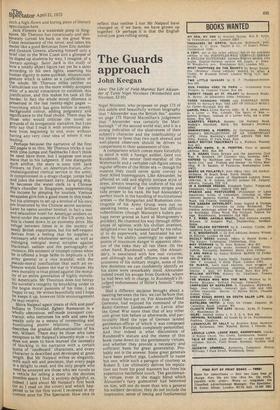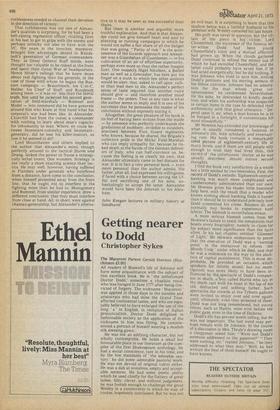The Guards approach
John. Keegan Alex: The Life of Field-Marshal Earl Alexander of Tunis Nigel Nicolson (Weidenfeld and Nicolson, 0.95)
Nigel Nicolson, who proposes on page 173 of this subtle and beautifully written biography that "Alexander was the British Ike," quotes on page 175 Harold Macmillan's judgement that " Alexander was certainly the Marlborough "of the second world war; and it is a strong indication of the elusiveness of their subject's character and the indefinability of his claims to fame that two such shrewd and well-placed observers should be driven to comparisons in their assessment of him.
A comparison which comes more forcefully to mind is with a foreign soldier, Gerd von Rundstedt, the senior field-marshal of the Wehrmacht and a veritable cult-figure among regular officers of the Hitler era — though for reasons they could never quite convey to their Allied interrogators. Like Alexander, he affected an odd and slightly antique style of dress, always wearing the uniform of his old regiment instead of the carmine stripes and tabs proper to his rank. He had Alexander's perfect touch in the handling of multinational armies — the Hungarian and Rumanian contingents of his Army Group were not on speaking terms — and brilliant but difficult subordinates (though Manstein's hubris perhaps never grated as hard as Montgomery's prickles). He charmed his way through differences of opinion with his civilian overlord, delighted even his harassed staff by his refusal to do paperwork, and fascinated his soldiers by his ability unerringly to appear at points of maximum danger in apparent oblivion of the risks they all ran there. On the other hand, Rundstedt's name, like Alexander's, is associated with few real victories, and although his staff officers insist on the acuteness of his military insight, some of the few decisions we can confidently identify as his alone were remarkably timid. Alexander indeed owed his escape from Dunkirk, where he had been left in charge, to Rundstedt's illjudged endorsement of Hitler's famous "stop order."
Had a different decision brought about a meeting between the two, we can betire that they would have got on. For Alexander liked Germans, had enjoyed his command of the Baltic-German Landeswehr in Latvia after the Great War more than that of any other unit given him before or afterwards, and particularly liked the type of German landed gentleman-officer of which it was composed and which Rundstedt completely personified. And that indeed is what discussions of Rundstedt's stature and the theme of this book come down to: the gentlemanly virtues, and whether they provide a necessary and sufficient basis for great generalship. Probably not is the answer. Some great generals have been perfect pigs, Ludendorff to name but one, while such a paragon of courtesy as Robert E. Lee ultimately derives his reputation not from his good manners but from his superlative battlefield touch. The gentlemanly virtues, even in the magic blend which Alexander's fairy godmother had bestowed on him, will not do more than win a general his soldiers' devotion; they do not include the inspiration, sense of timing and fundamental
ruthlessness needed to channel their devotion in the direction of victory.
That ruthlessness was not one of Alexander's qualities is surprising, for he had been a hell-raising regimental officer, rivalling Gort in his lust to get to grips with the enemy and perhaps unlucky not also to have won the VC. His years in the trenches, moreover, brought him advantages denied to Rundstedt's generation of German commanders. They, as Great General Staff minds, were thought too valuable to be risked at the front and spent their Great War at headquarters. Hence Hitler's railings that he knew more about real fighting than his generals; in the case of those with whom he began the Russian campaign — Brauchitsch, his C-in-C, Haider, his Chief of Staff, and Rundstedt among them — it was no less than the literal truth. Not until he jockeyed his second generation of field-marshals — Rommel and Model — into command did he have generals around him who knew at first hand what his corporal's war had been like. In Alexander, Churchill had from the outset a commander with nothing to learn about man's capacity for inhumanity to man. Where, en route between lieutenant-colonelcy and lieutenantgeneralcy, did he lose his killer-instinct, as lose it he seemed to do?
Lord Mountbatten and others implied to the author that Alexander's mind, though perfectly attuned to the tactical Sturm und Drang, lacked the power to frame a strategically lethal intent. One wonders. Strategy is not really a more exacting science than tactics. He may well, however, having suffered in Flanders under generals who interfered from a distance, have come to the conclusion, when himself promoted away from the front line, that he ought not to interfere in the fighting more than he had to. Montgomery and Rommel, from similar experience, drew a different conclusion: that they must interfere from close at hand. All, in short, were against chateau-generalship, but Alexander's alterna
tive to it may be seen as less successful than theirs.
But there is another and arguably more truthful explanation. And that is that Alexander could not give himself heart and soul to planning or running campaigns in which he would not suffer a fair share of all the danger that was going. " Parity of risk "is the quintessence of the Guards approach and Alexander was a Guardsman of Guardsmen — in his cultivation of an air of effortless superiority, perhaps even more so than the rather fusspot Gort. One suspects Nigel Nicolson, a Balliol man as well as a Grenadier, has here put his finger on a truth to which few other authors would be alert: that, asked to call upon, rather than lead men to die. Alexander's perfect sense of taste required that another voice should give — and therefore another mind frame — the orders. That at any rate is what the author seems to imply and it is one of his successes that he persuades the reader of his conclusion without expressly stating it.
Altogether, the great pleasure of his book is its feel of having been written from the inside — by someone who perfectly understands the • gradations of snobbery, invisible to outsiders, practised between Foot Guard regiments, who knows, because he shared, the Brigade's collective pride in the Micks' Field-Marshal, who can imply sympathy for, because he risked death at the hands of the German defend ers of Italy, who can half-convince us, be cause the feeling is so clearly his own, that Alexander ultimately came to feel distaste for war. It is in fact a very personal book — even more personal than the author admits. His father, after all, had expressed his willingness, if faced with a choice between saving the Uffizi and sacrificing one of his sons, unhesitatingly to accept the latter. Alexander would have been the Jehovah to his Abraham.
John Keegan lectures in military history at Sandhurst



































 Previous page
Previous page